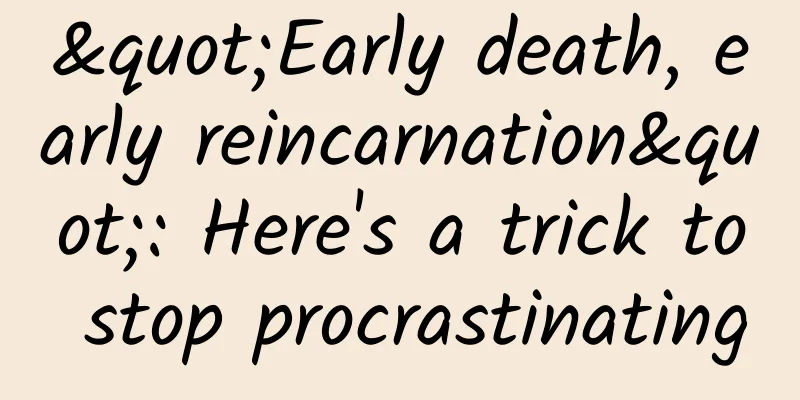"Early death, early reincarnation": Here's a trick to stop procrastinating

|
Author: Sun Hailong Shen Sichu The article comes from the Science Academy official account (ID: kexuedayuan) —— In daily life, do the following scenes seem familiar to you? When you are about to face an important exam or a punishment that is difficult to avoid, the "calm before the storm" makes you feel uneasy, and the thought of "dying early and being reborn early" keeps lingering in your mind. You wish that the thing you are worried about would happen immediately, and you want to get through this disaster quickly so that you can breathe a sigh of relief sooner. What’s going on? We are all members of the “Anti-Procrastination Team”, so how come procrastination is cured now? Learn about the psychology of negative discounts According to the classic time discounting theory, when people are faced with intertemporal decisions in loss situations, they should be more inclined to postpone the occurrence of losses, that is, “the longer you can delay, the better”, which we call the positive discounting phenomenon; while the idea of “dying early and being reborn early” mentioned above shows that people sometimes prefer immediate losses, which researchers call the negative discounting phenomenon. Illustration of negative discount phenomenon (Image source: Li Shu, 2019, Fudan Business Knowledge) Negative discounting can effectively avoid the waste of various human and social resources caused by delaying negative events (such as delaying vaccination, paying fines late, and delaying completing academic tasks). (It seems to be an effective treatment for procrastination.) However, although people have a certain understanding of the relevant psychological mechanisms for making decisions at different time points, little is known about the negative discounting phenomenon involving future losses. In order to further understand the phenomenon of negative discounting and explore an intervention method that is consistent with negative discounting in future losses, the research group of Li Shu from the Key Laboratory of Behavioral Science, Institute of Psychology, Chinese Academy of Sciences and the team of Professor Li Aimei from the School of Management, Jinan University recently proposed a novel explanation of "free from care" for the phenomenon of negative temporal discounting. The research results, "Early departure, early revival: A "free from care" account of negative temporal discounting", were recently published in the journal "Advances in Cognitive Psychology". The scientific explanation of "early death and early rebirth": caring about things is the key Previous studies have viewed negative discounting as a process of trying to avoid waiting for negative events, because the process of waiting for a negative outcome is inherently disgusting. Some researchers also believe that a delayed negative event will cause individuals to have a "dread" mentality, and this fear mentality will promote the occurrence of negative discounting. The process of waiting for negative events is always painful (Image source: Google Image Library) Based on previous research, Li Shu's research team revealed through content analysis that while waiting for a negative event, an individual will produce two psychological components: anticipatory emotion and anticipatory rumination. Anticipatory emotion is the accumulation of negative emotions caused by waiting for future negative events, while anticipatory rumination is the individual's involuntary worry or concern about negative events during the waiting process (in layman's terms, it means "always thinking about that thing", occupying the brain's memory). The researchers speculated on the mechanism by which anticipatory rumination affects the immediate experience of negative events: rumination (i.e., worry) during the process of waiting for a negative event will occupy limited cognitive resources, and adding subsequent events (worries) after the negative event will also trigger additional rumination (i.e., worry), occupying more cognitive resources. Therefore, under the premise of having subsequent events (worries), only by resolving (eliminating) the negative event as soon as possible can the occupied cognitive resources be freed up, thereby ensuring the completion quality of the subsequent events. Does it seem a little hard to understand at first glance? Stay calm, don't panic, let's take an example: Imagine that you are a senior, preparing for your graduation thesis defense in five days, and you also have to go to a good company for an interview in a week. At this time, the graduation thesis defense is a negative event, and the interview is a "concern". While you are waiting for the defense, you not only have to worry about the defense, but also have to spend some time and energy preparing for the interview. Therefore, worrying about the defense makes you ruminate (i.e. worry), and "worrying about things" will also trigger additional rumination, occupying more cognitive resources. Therefore, in order to ensure that you can successfully complete the subsequent interview, you may be eager to finish the defense quickly so that you can prepare for the interview wholeheartedly, that is, "die early and be reborn early". Based on the above logic, the study proposes the research hypothesis that "worrying things" and the additional rumination they cause can prompt individuals to choose to experience negative events as soon as possible. Based on this, the researchers also proposed a "de-worrying" explanation of negative time discounting: "de-worrying" means experiencing negative events as quickly as possible (i.e. "early death") to leave enough time and energy to ensure the quality of subsequent events (i.e. "early rebirth"). “Having or not having something to worry about” makes a big difference After reading the above explanation, I believe everyone has discovered that we mentioned a key role in the inference - concern. So is "concern" the key factor in the occurrence of the "negative discount phenomenon"? What is its internal mediating mechanism? Study 1 In Study 1, the researchers invited 59 undergraduates to participate and asked them to imagine taking an oral English test. The subjects had to choose a time within a week when they wanted to take the test. Then, the subjects rated whether the oral English test represented a negative event. The results show that oral English exams are viewed as negative events, and the more negatively the subjects evaluate oral English exams, the more likely they are to choose to take the exam as soon as possible. It seems that Study 1 not only proves that the English oral test can be regarded as a negative event, but also preliminarily confirms the existence of the negative discounting phenomenon. Study 2 In Study 2, the researchers invited 75 undergraduates and asked them to choose a day in a week to take an oral English test. However, before making the decision, the participants in the experimental group were told that they needed to present a course paper on the tenth day (something they were concerned about), while the participants in the control group were told that they needed to attend a class party on the tenth day (no organization was required). Then, the participants were asked to rate the degree of distraction they felt from the “paper presentation” and “class party”. The results showed that under the "paper presentation (with worries)" condition, the subjects were more inclined to choose to take the exam earlier (a negative event); and the "paper presentation" caused the subjects to be distracted to a significantly higher degree than the "class party". Through rumination and distraction, "worries" have an impact on individuals' choice preferences. Individuals' preference for immediate negative experience under the condition of concern (Image source: drawn by the author) This shows that the emergence of "concerns" makes individuals think that this matter needs to be ruminated and distracted. In order to protect limited cognitive resources, they are more willing to face negative events earlier. However, in Study 2, the degree of "concern" was manipulated using different tasks, and factors such as emotions were not controlled. In order to further confirm the robustness of the results, the researchers conducted Study 3. Study 3 The research procedure of Study 3 was adapted from the control group task in Study 2. Participants played different roles in the imaginary "class reunion" (difficulty and importance of the task), thus having different levels of concern for the "class reunion" (no concern/little concern/more concern). After completing the selection of the oral test date and rating the degree of distraction, participants in each group were also required to rate their own negative emotions (anxiety and worry) and positive emotions (happiness and excitement). The results showed that the group with many worries was more inclined to take the test earlier, and the negative emotions generated by the subjects were significantly higher than the positive emotions. This also confirmed the negative event attributes of the oral test. The degree of distraction felt by the subjects in the group with many worries was also significantly higher than that in the other two groups. Subsequent analysis proved that the distraction and rumination caused by worries still led to the subjects' preference for negative events. Individuals' preference for immediate negative experience under high-care, low-care, and no-care conditions (Source: Author) Therefore, the above studies have come to a robust conclusion: under the premise of "concerns", individuals are more likely to choose to experience negative events earlier (English oral test). That is to say, when individuals expect to experience a negative event and a subsequent worry event that will take up their energy and time, they are more likely to choose to experience the negative event earlier in order to focus more on the subsequent tasks they care about. So, to avoid procrastination, should we give ourselves more tasks? Too simple! Time is also crucial! When to add "concern" has a big impact When you add pressure on yourself, you should pay attention to the choice of time. Because according to the explanation of "getting rid of worries": only when the time of the "worry" event is outside the interval of negative events, choosing to get rid of negative events early (i.e. "early death") will make sense, because you can leave enough time and energy to deal with the "worry". If the "worry" event occurs within the interval of negative events, the situation will be different. Based on this logic, the researchers hypothesized that people’s preferences for negative time choices would be different if the time of the “concern” was within or outside the time interval of the negative event. To test this hypothesis, the researchers conducted Study 4. Study 4 In Study 4, the oral exam was still assumed to be held within a week, and the researchers considered organizing a class reunion after the exam as a "concerning matter." One group of subjects had a class reunion outside the time interval of the negative event (the 10th day), while the other group of subjects had a class reunion within the time interval of the negative event (the 4th day). The results of the study found that when the worry occurred outside the interval of the negative event, the subjects were more inclined to take the oral test as early as possible (compared to when the worry occurred within the interval of the negative event). That is, students tended to choose an earlier date to complete the oral test (excluding the negative event) (i.e., "early death") in order to free up time and energy to ensure the completion of organizing the class reunion (worry) (i.e., "early transcendence"). Adding concerns at different times affects individuals' preferences for negative events (Image source: drawn by the author) Field experiment: It really affects decision-making preferences The above studies all used virtual situations to measure the independent variables and dependent variables, so whether the research results are applicable to real environments outside the laboratory has not yet been verified. In order to enhance the ecological validity of the research results, the researchers selected a natural class of a university's elective psychology course to conduct a field experiment, seeking to further confirm the existing research results in a real environment. Study 5 In Study 5, the researchers used the course design to arrange two oral course reports as course assessments, and asked students to choose one day to participate in the two reporting time periods. The first report period was set at the 1st to 6th week of the semester, and the second report period was set at the end of the semester. The researchers speculate that at the beginning of the semester, the distant final exam is a "less worrying" thing; but at the end of the semester, when the exam weeks for each subject are approaching, the final exam becomes a "more worrying" thing. The experimental results found that: at the beginning of the semester, the subjects were more inclined to postpone the inter-temporal decision of negative events (not wanting to report on the course), but as the end of the semester approached, the individual's choice tendency reversed, and they were more inclined to experience negative events as early as possible (wanting to report on the course earlier). The percentage of people who have a recent preference for negative events at the beginning and end of the semester (Image source: drawn by the author) Treatment tips for procrastinators Through five experiments, the study found that in some cases, people are more willing to experience a negative event immediately, not because the negative utility of delaying the event is smaller, but because experiencing the negative event immediately can free up more time and energy to better deal with subsequent concerns. This also proves that the "de-concern" explanation of the negative discount phenomenon is valid. It may be easier for us to understand this research result and theoretical explanation by analogy with the classic Robers Cave experiment in social psychology. The cave experiment refined a simple and effective method to promote cooperation: when members of the group encounter external threats, the members will change from competition to cooperation. Similarly, this study also found a method that can promote the early experience of negative events. When people face subsequent concerns, they will change from preferring to postpone negative events to preferring immediate negative events. The two studies have one thing in common, that is: to promote a difficult (contrary to habit) but beneficial thing by setting up other external events (threats or concerns). Connecting the research findings to real life, we can discover a simple and effective method to nudge people toward behavior (a great way to treat procrastinators): simply set up something to worry about to nudge people toward changing their preferences and experiencing negative events earlier. There are many examples of delayed negative events in life that can be improved with the help of the nudge method. For example, the "review" process is a representative example: since journal review is also a time-consuming and energy-consuming task like oral examinations, many reviewers accept the review invitation in advance, but will repeatedly delay the completion time. This delay is undoubtedly a huge disaster for young contributors who are eager to get promoted by publishing articles. If a follow-up concern is set for the reviewer, the reviewer may be more willing to deal with the manuscript earlier, and the manuscript publication process will be more efficient. (Image source: Google Image Library) Finally, this method of setting up "external enemies" (follow-up concerns) discovered in this study is expected to join the ranks of nudge technology. It is hoped that through this research, it can contribute to improving people's health, wealth and happiness. References: [1]Sun, HL,# Li, AM, # Shen, SC,# Xiong, GX, Rao, LL, Zheng, R., Sun, HY,* & Li, S.* (2020). Early departure, early revival: A “free from care” account of negative temporal discounting. Advances in Cognitive Psychology, 16(2), 103-116. doi.org/10.5709/acp-0289-0. [2] Sun Hailong, Li Aimei, Shen Sichu, Xiong Guanxing, Rao Lilin, Zheng Rui, Sun Hongyue, Li Shu. (2020). Early death and early rebirth: a “de-caring” explanation of negative discounting. [ChinaXiv:202006.00245] (Chinese version available in Psychology preprint) [3]Sun, HY, Li, AM, Chen, S., Zhao, D., Rao, LL, Liang, ZY, & Li, S.*(2015). Pain now or later: An outgrowth account of pain-minimization.PLOS ONE,10(3),1-17. [4]Harris, CR (2012), Feelings of dread and intertemporal choice. Journal of Behavior. Decision Making, 25, 13-28. doi:10.1002/bdm.709. |
Recommend
When is Xiaomi's 10th anniversary in 2020? What phone will Xiaomi release for its 10th anniversary?
Xiaomi's 10th anniversary flagship Xiaomi 10 ...
Abdominal distension during menstruation
People will feel a heavy pain in their lower abdo...
What to do if you have acid reflux during early pregnancy
Pregnant women in the early stages of pregnancy o...
What is the cause of blood clots in threatened miscarriage?
The early stages of pregnancy are a time when pre...
Please use with caution the "anti-suffocation magic mask" that is not used for standardized epidemic prevention!
◎ Science and Technology Daily reporter Hua Ling ...
How to prevent breast sagging after childbirth
In today's social life, every couple hopes to...
How to exercise waist muscles, waist exercise has tricks
The waist is an important part that supports the ...
How to Contour a Round Face
The biggest form of plastic surgery in Asia is ma...
What are the taboos of eating hot pot? What are the benefits of eating hot pot in winter?
Peanut sprouts are a very nutritious food, contai...
The correct walking posture for girls
The walking posture of girls and boys is complete...
How painful is medical abortion?
Medical abortion is a very common method of abort...
Girls are itchy and painful below
In life, many women suffer from gynecological dis...
Bleeding inexplicably below
If female friends find that they have unexplained...
Bleeding and stomach pain during pregnancy
Pregnancy is a happy thing, but there are also ma...









